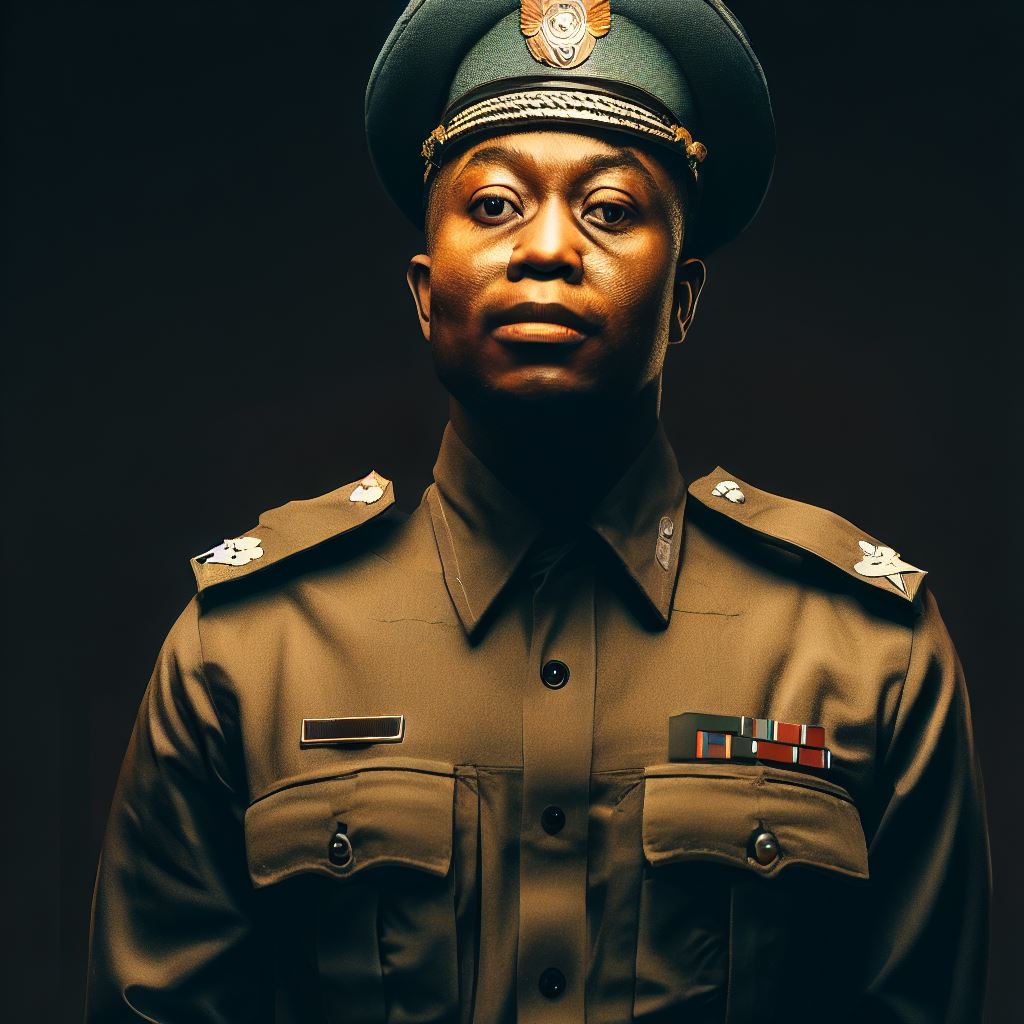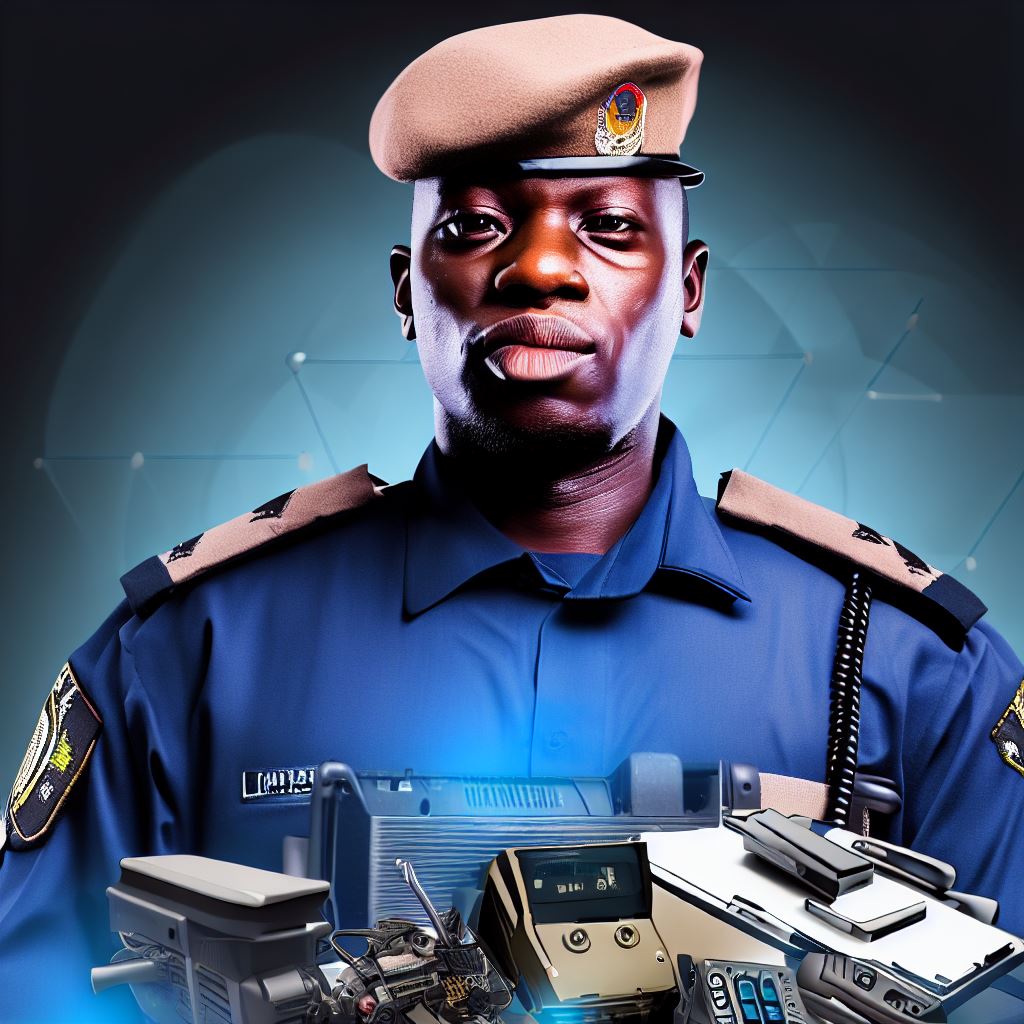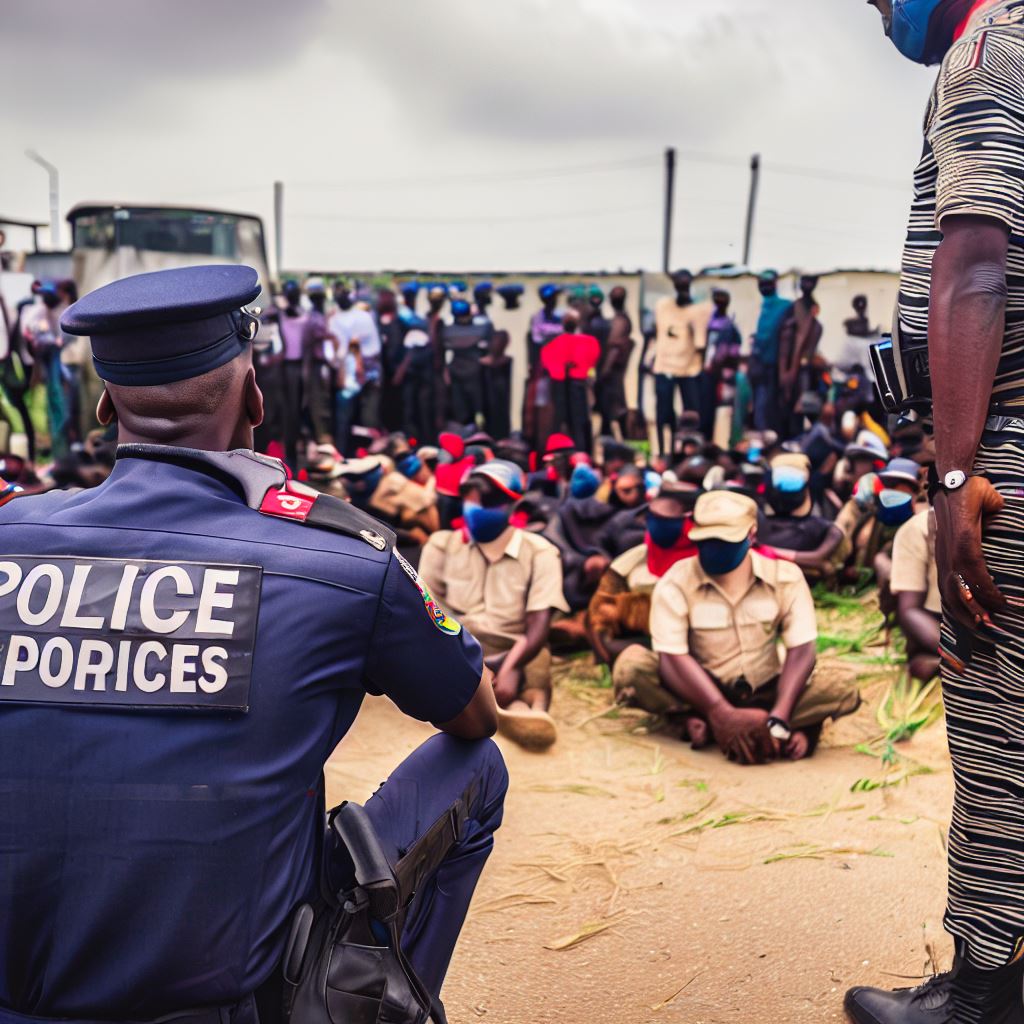Introduction
In Nigeria, women have played a crucial role in the country’s police force for many years.
With the aim of promoting gender equality, the force has increasingly provided opportunities for women to contribute their skills and expertise.
This blog post will explore the roles and opportunities available to women within Nigeria’s police force.
By highlighting the progress made and the challenges still present, we can gain a deeper understanding of the importance of women in law enforcement in Nigeria.
The History of Women in Nigeria’s Police Force
In this section, we will delve into the history of women in Nigeria’s police force, exploring the initial establishment of the force and the absence of women, the introduction of the first women in the force and their pioneering roles, and the progression of women’s inclusion in various departments and ranks over the years.
A. Overview of the Initial Establishment of the Force and the Absence of Women
When the Nigeria Police Force was established, it was predominantly a male-dominated institution.
During its early years, there was a notable absence of women, with policing duties primarily handled by men.
This absence of women in the force was largely due to societal norms and gender stereotypes prevalent at the time.
Women were generally considered unsuitable for law enforcement roles, which were traditionally viewed as masculine.
As a result, women were often excluded from participating in law enforcement and serving in the police force.
B. Introduction of the First Women in the Force and Their Pioneering Roles
- In the 1950s, Nigeria started witnessing the gradual inclusion of women in the police force.
- The first batch of women to join the force faced numerous challenges and resistance.
- However, their determination and resilience paved the way for other women to follow their footsteps.
- These pioneering women proved themselves capable of performing a wide range of police duties.
- They were assigned tasks such as handling domestic and sexual violence cases, child protection, and community policing.
C. Progression of Women’s Inclusion in Various Departments and Ranks Over the Years
Over the years, there has been a gradual increase in the inclusion of women in different departments within the police force.
Women have made significant strides in areas such as detective units, intelligence gathering, and forensic analysis.
They have also risen through the ranks, with an increasing number of women achieving leadership positions.
The Nigerian government has actively implemented policies to encourage the recruitment and advancement of women in the force.
These policies aim to break down gender barriers and ensure equal opportunities for women in law enforcement.
In essence, the history of women in Nigeria’s police force reflects a progression from their initial absence to their growing inclusion and advancement over the years.
Despite facing initial challenges and resistance, women have demonstrated their capabilities and proved their worth in various roles within the force.
With continued efforts to promote gender equality and provide equal opportunities, the Nigerian police force is becoming a more diverse and inclusive institution.
Read: Police Welfare and Benefits: An Insight into Nigeria
Current Roles and Responsibilities of Women in Nigeria’s Police Force
Women in Nigeria’s Police Force play diverse roles that contribute significantly to maintaining law and order.
They actively participate in various aspects of policing, including community engagement, investigations, and special tactical operations.
Moreover, their presence in decision-making positions has a positive impact on policy development.
A. Diverse Roles Women Currently Hold within the Force
Women in Nigeria’s Police Force serve in a wide range of capacities, showcasing their versatility and dedication.
They can be found in both operational and administrative roles, ensuring the smooth functioning of the organization.
Some common roles held by women include:
- Beat Officers: Women patrol the streets, parks, and public spaces, responding to emergencies and ensuring public safety.
- Investigators: Women contribute to solving crimes by conducting investigations, gathering evidence, and interviewing witnesses.
- Forensic Experts: Women with specialized skills work in the forensic departments, analyzing evidence and aiding in criminal investigations.
- Traffic Women Officers: Women manage traffic flow, ensuring compliance with traffic rules and maintaining road safety.
- Special Weapons and Tactics (SWAT) Members: Some women undergo specialized training to become part of SWAT teams, handling high-risk situations.
- Community Policing Officers: Women work closely with communities, building trust, and addressing the specific needs of each area.
- Police Dog Unit Handlers: Women take care of police dogs and aid in search and rescue operations.
- Training Instructors: Experienced female officers play a crucial role in training new recruits and passing on their knowledge.
B. Women’s Contribution in Community Policing, Investigative Units, and SWAT Teams
Women in Nigeria’s Police Force have made significant contributions to community policing, investigative units, and SWAT teams.
In community policing, women officers are essential in establishing trust between the police and the community.
Their empathetic approach allows them to address the unique concerns of women and children, helping to build safer neighborhoods.
In investigative units, women play a crucial role in solving crimes. Their attention to detail, communication skills, and ability to build rapport enable them to gather vital information and pursue leads effectively.
Women also contribute to SWAT teams, which handle high-risk operations.
Their skills in marksmanship, physical fitness, and tactical decision-making make them valuable assets in complex and dangerous situations.
C. Women’s Participation in Decision-Making Positions and Their Impact on Policy Development
Women’s participation in decision-making positions within Nigeria’s Police Force has had a positive impact on policy development.
With increased representation, women bring diverse perspectives and experiences to the table, leading to more comprehensive and inclusive policies.
They advocate for gender-sensitive approaches that address the specific needs of women and promote gender equality within the organization.
Women in decision-making positions also serve as role models and inspire other female officers to pursue leadership roles, resulting in more women joining the force and actively contributing to its development.
In fact, women in Nigeria’s Police Force hold diverse roles and responsibilities. They contribute significantly to community policing, investigations, and SWAT teams.
Their participation in decision-making positions positively impacts policy development and promotes gender equality within the organization.
Read: Challenges and Successes of Policing in Nigeria Today
Challenges Faced by Women in Nigeria’s Police Force
A. The prevailing cultural and societal barriers hindering women’s growth and progress
- Traditional gender roles and expectations limit women’s opportunities for advancement.
- Deep-rooted stereotypes perpetuate the belief that women are not suited for law enforcement.
- Influence of patriarchal norms restricts women from assuming leadership positions within the force.
- Lack of representation and visibility of successful women in the police force hinders aspiring female officers.
B. Discrimination, gender stereotypes, and lack of support from male colleagues
- Female officers often face discrimination and unequal treatment within the police force.
- Gender stereotypes undermine women’s credibility and competence in performing their duties.
- Male colleagues may perpetuate a hostile work environment by excluding or marginalizing female officers.
- Lack of support and encouragement from male colleagues can hamper female officers’ confidence and career growth.
C. The impact of these challenges on female officers’ professional development and mental well-being
- Limited career advancement opportunities hinder female officers’ ability to reach higher ranks.
- Constant exposure to gender bias and discrimination can lead to decreased job satisfaction and motivation.
- The need to prove themselves constantly puts an additional burden on female officers, leading to high levels of stress.
- The lack of a supportive work environment can contribute to feelings of isolation and frustration among female officers.
In short, women in Nigeria’s police force face various challenges that hinder their growth, development, and well-being.
The prevailing cultural and societal barriers, such as gender stereotypes and limited opportunities, create significant obstacles for female officers.
Discrimination and lack of support from male colleagues further exacerbate these challenges.
The impact of these challenges is not only on professional development but also on mental well-being, leading to reduced job satisfaction and increased stress levels.
Creating a supportive and inclusive work environment, challenging gender stereotypes, and promoting equal opportunities are essential steps towards addressing these challenges and empowering women in Nigeria’s police force.
Read: The Role of the Police in Community Safety in Nigeria

Opportunities and Initiatives for Women in Nigeria’s Police Force
Women in Nigeria’s Police Force face numerous challenges in their quest to serve and protect their communities.
However, there are several opportunities and initiatives that aim to empower and support the women in the force.
A. Affirmative Action Policies and Gender Mainstreaming Programs
Affirmative action policies and gender mainstreaming programs have been introduced to promote gender equality within the police force.
These initiatives aim to bridge the gender gap and create an inclusive environment for women.
Through affirmative action policies, women are given special consideration in recruitment, promotion, and training.
This helps to address the historical imbalance and increase the representation of women in senior positions.
Gender mainstreaming programs focus on integrating gender perspectives into all aspects of police work, including policy formulation, training, and operations.
This ensures that the specific needs and challenges faced by women are adequately addressed.
By exploring and implementing these initiatives, the police force can create a more equal and inclusive environment for women officers to thrive.
B. Significance of Gender Sensitivity Training and Awareness Campaigns within the Force
Gender sensitivity training and awareness campaigns play a crucial role in promoting gender equality and addressing biases within the police force.
These training programs educate officers about the importance of treating male and female colleagues equally, combating gender stereotypes, and addressing gender-based violence.
They also help officers develop a better understanding of the unique challenges faced by women in law enforcement.
Awareness campaigns within the force can help change perceptions and promote a more inclusive culture.
By highlighting the achievements and capabilities of women officers, these campaigns challenge stereotypes and inspire others to support gender equality within the police force.
By prioritizing gender sensitivity training and awareness campaigns, the police force can foster a more respectful and inclusive environment for women officers.
C. Spotlight on Success Stories of Women in Nigeria’s Police Force
It is essential to celebrate the success stories of women in Nigeria’s Police Force who have overcome hurdles and achieved significant positions.
By highlighting the accomplishments of women officers, the force can inspire and motivate others to pursue careers in law enforcement.
These success stories serve as role models and demonstrate that gender is not a barrier to success within the force.
Additionally, sharing these success stories creates a sense of pride and solidarity among women officers.
It fosters a supportive network and encourages other women to strive for excellence in their careers.
Recognizing and celebrating the achievements of women officers sends a powerful message about the value and potential of women in law enforcement.
The opportunities and initiatives mentioned above hold immense potential in empowering and supporting women in Nigeria’s Police Force.
Affirmative action policies, gender mainstreaming programs, gender sensitivity training, awareness campaigns, and spotlighting success stories can all contribute to creating a more inclusive and equal law enforcement environment.
It is vital to continue advocating for these initiatives to ensure that women in the force have the same opportunities and can contribute fully to the safety and security of their communities.
Read: Nigeria Police Force: Duties, Powers, and Responsibilities
Strategies to Enhance Women’s Participation in Nigeria’s Police Force
A. The importance of recruitment and retention strategies for women
Recruitment and retention strategies are crucial to increase the representation of women in the police force.
- Create gender-inclusive recruitment policies that encourage more female applicants to join the force.
- Increase outreach programs to educate young girls about the opportunities and benefits of a career in law enforcement.
- Implement affirmative action initiatives that reserve a certain percentage of positions for women.
- Provide equal training and development opportunities to both male and female officers.
- Offer competitive salaries and benefits packages to attract and retain talented female officers.
B. Improving work-life balance and creating a conducive working environmen
In addition to recruitment and retention strategies, improving work-life balance is essential to support women in the police force.
- Implement flexible working arrangements, such as part-time and job-sharing options, to accommodate family responsibilities.
- Establish maternity and paternity leave policies that provide adequate time off for new parents.
- Create on-site childcare facilities or partner with nearby daycare centers to support officers with young children.
- Offer counseling and mental health services to address the unique challenges women may face in a male-dominated profession.
- Foster a supportive and inclusive working environment that values work-life balance for all officers.
C. Mentorship programs and networking opportunities to support female officers’ career growth
Mentorship programs and networking opportunities play a crucial role in supporting the career growth of female officers.
- Establish mentorship programs that connect experienced female officers with younger recruits to provide guidance and support.
- Encourage male officers to mentor and champion their female colleagues, promoting gender equality within the force.
- Create networking events and platforms where female officers can connect with influential individuals within and outside the police force.
- Provide leadership development programs specifically designed for women to enhance their skills and prepare them for higher positions.
- Recognize and celebrate the achievements and contributions of female officers to inspire future generations.
In a nutshell, enhancing women’s participation in Nigeria’s police force requires a multi-faceted approach.
By implementing recruitment and retention strategies, improving work-life balance, and promoting mentorship programs and networking opportunities, the police force can create a more inclusive and empowering environment for female officers.
Women have an important role to play in maintaining law and order, and it is crucial to provide them with the necessary support and opportunities for their professional growth and success.
Conclusion
Throughout this blog post, we have discussed the roles and opportunities for women in Nigeria’s police force.
The main points highlighted include:
- Increasing inclusion of women in law enforcement can lead to more effective and responsive policing.
- Challenges such as gender biases and cultural barriers still exist but can be overcome through sustained efforts.
- Efforts to enhance women’s roles and opportunities in the police force have been made through recruitment drives and capacity-building programs.
- Women in the police force have showcased their capabilities in diverse areas such as investigation, community policing, and leadership positions.
It is crucial to recognize the importance of continued efforts to enhance women’s roles and opportunities in Nigeria’s police force.
By creating a more inclusive and gender-balanced law enforcement institution, we can ensure a safer and more secure society for all. We should all actively support and empower women in law enforcement.
This can be done by advocating for gender equality in the police force, providing mentorship and professional development opportunities, as well as fostering a supportive environment that values diversity.
Together, let’s work towards a future where women in Nigeria’s police force have equal opportunities to contribute their skills and expertise in maintaining law and order.




